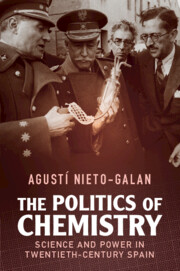Book contents
- The Politics of Chemistry
- Science in History
- The Politics of Chemistry
- Copyright page
- Dedication
- Contents
- Figures
- Preface
- Acknowledgements
- Chronology
- Abbreviations
- Introduction
- 1 Dreams of Modernity
- 2 A Republican Science
- 3 War Weapons
- 4 Totalitarian Ambitions
- 5 Autarchic Ambiguities
- 6 Technocratic Progress
- 7 Liberal Dissent
- Conclusion: The Moral Ambiguity of Chemistry
- Bibliography
- Index
7 - Liberal Dissent
Published online by Cambridge University Press: 12 August 2019
- The Politics of Chemistry
- Science in History
- The Politics of Chemistry
- Copyright page
- Dedication
- Contents
- Figures
- Preface
- Acknowledgements
- Chronology
- Abbreviations
- Introduction
- 1 Dreams of Modernity
- 2 A Republican Science
- 3 War Weapons
- 4 Totalitarian Ambitions
- 5 Autarchic Ambiguities
- 6 Technocratic Progress
- 7 Liberal Dissent
- Conclusion: The Moral Ambiguity of Chemistry
- Bibliography
- Index
Summary
Chapter 7 describes some of chemists’ strategies of resistance to totalitarianism and the co-construction of new, intermediate spaces. Going backwards chronologically, it explores the liberal ethos of the Spanish chemical community in exile after the Civil War and the way in which it evolved in the Latin American context in particular. It also highlights some chemists’ attempts to protect liberal values in the chemical industry, in the universities and in the public sphere in hostile, anti-liberal contexts such as Franco’s dictatorship, as well as how some of them survived as internal refugees. The exiled Latin American chemical community protected Republican values of internationalism and pacifism and combined them with a liberal, flexible relationship (in economic terms) with private chemical firms, but also frequent commitments in favour of public companies (oil, hormones and the extraction of natural products). Inside Spain, some chemists set their own limits of academic power and constructed their own shelters in the press and in their collaboration with private companies. Following the university crisis of the 1960s, and in spite of the official optimism about economic growth, some chemical shelters had begun to challenge the values of the dictatorship, which formally ended after Franco’s death on 20 November 1975.
Keywords
- Type
- Chapter
- Information
- The Politics of ChemistryScience and Power in Twentieth-Century Spain, pp. 189 - 215Publisher: Cambridge University PressPrint publication year: 2019

